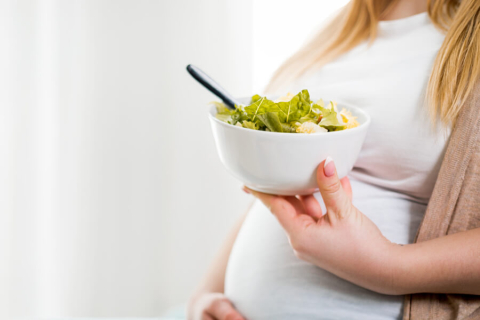Pregnant women's lifestyles, behaviors, and choices have consequences not only for women's health, but also for the health and well-being of the offspring. That is why this topic is so important for us - not only as scientists, but also as participants of social life - said at the opening of the symposium Professor Mariusz Gujski, Dean of the Faculty of Health Sciences.
Health promotion in the midwifery
One of the items on the agenda was a "one to one" conversation between the conference host - Dominik Olejniczak, MD, PhD, and Dr. Agnieszka Wyrozebska from the Department of Public Health, midwife and educator, who shared her insights on the role and effectiveness of health promotion in midwifery. She pointed out that health promotion is an integral part of midwives' daily activities, highlighted in a special way, for example, in the EU directive. In Poland, there has recently been a growing emphasis on education and prevention of pregnancy and before pregnancy, although there is still much to be done. According to the speaker, one of the factors determining the effectiveness of promotional and preventive activities is the issue of their availability. Dr. Agnieszka Wyrozebska also emphasized that the effects of health promotion have to be waited for, so it may seem that it is not a profitable investment. However, the lack of emphasis on health promotion in any medical profession will bring huge social costs in the long run.
Facts and myths about pregnant women's health
The second day of the conference was devoted entirely to the presentations by students and doctoral students. It was preceded by an inaugural lecture by Justyna Teliga-Czajkowska, MD, PhD, from the Department of Obstetrics and Gynecology Education, Vice-Dean for Obstetrics of the Faculty of Health Sciences, who dispelled myths concerning pregnant women's health. Thus, the participants of the event learned, among other things, that the most favorable means of transport for a pregnant woman is a train, and while driving a car a future mother should fasten her seat belt. There are no contraindications for drinking coffee during pregnancy, especially weak coffee with milk, whereas green tea is not recommended as it causes temporary bradycardia, which can lead to abnormal utero-placental circulation. Drinking alcohol is completely contraindicated, as any amount is bad for the baby. E-cigarettes can be just as harmful, or even more so than traditional cigarettes. And the effect of smoking nicotine during pregnancy is narrowing of blood vessels, intrauterine growth retardation, and birth of smaller and hypoxic babies.
Student Sessions
Among the diverse topics, students presented issues rarely addressed in the public space, including prenatal music therapy, paternal "baby blues," and procreation of disabled women. The papers were judged by a scientific committee. The best of them were awarded. The scientific committee decided to award:
- First place to Joanna Kaluza, Magdalena Knop, Beata Szulc-Musioł and Barbara Dolinska for the paper "Quercetin for gestational diabetes - a chance for new therapy?";
- Second place to Dominica Mroczkowska, Katarzyna Panek and Magdalena Sulima for the paper "Procreation of disabled women in the opinion of professionally active midwives";
- Third place ex aequo went to:
Weronika Skonieczna and Paulina Kwaśniewska for their work "Paternal baby blues";
Paulina Nakonieczna, Aleksandra Zdybel and Magdalena Sulima for the paper " Dietary assessment of pregnant women"
- Honorable mentions went to Dominika Mroczkowska and Magdalena Sulima for the paper "Ultrasound examination in pregnancy - the role of the midwife in preparing the patient for the examination".
The winning paper focused on gestational diabetes, which can lead to spontaneous abortions, birth defects in infants and perinatal mortality. The authors - students from the Silesian Medical University in Katowice, based their analysis on a Google Scholar and Pubmed review, using the words "pregnancy," "diabetes mellitus," and "quercetin." Based on this, they concluded that quercetin is a compound that has the potential to help treat gestational diabetes, but future clinical trials are needed.
The event was organized by the Department of Public Health MUW and the Student Scientific Society of Public Health - Health Promotion Section in cooperation with the Healthy Engaged Citizens Foundation. The event was hosted by Dominik Olejniczak, MD, PhD, from the Department of Public Health MUW. The conference was held under the patronage of the Medical University of Warsaw, Faculty of Health Sciences, Ochota District, Supreme Chamber of Nurses and Midwives. Media patron was radio station radio for you.
